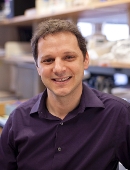The Sharp lab is an integrated research environment combining both experimental and bioinformatic approaches. My research uses genomic approaches to study the human genome and disease, utilizing a strategy that can be described as 'reverse genetics'. The theory behind this idea is that rather than studying a specific condition, we use a bottom-up approach using high-throughput techniques to study various aspects of the human genome, and then link these observations to different diseases.
My lab therefore performs global analyses of structural variation, epigenetics, and gene expression combining innovative experimental and bioinformatic approaches. We use both wet lab technologies such as DNA microarrays and high-massively parallel sequencing in addition to performing computational analyses of the human genome, and large datasets produced by high-throughput technologies.
What can this approach do? During my postdoctoral work, I developed custom microarrays to study structural variation of the human genome. By first analyzing the human genome computationally, we identified regions that had a structure that suggested they might render them unstable and prone to frequent rearrangement. By focusing our studies on these regions, we were then able to identify many new genetic syndromes that together account for ~2% of cases of mental retardation worldwide, and also act as susceptibility factors for autism, schizophrenia and diabetes. One also represents the most common genetic risk factor for epilepsy identified to date.
More recently we have developed genome-wide technologies for analyzing DNA methylation, an epigenetic modification that controls how genes are switched on and off. By comparing methylation patterns in healthy and diseased patients, we can discover what parts of the genome regulate patterns of gene expression, hence identifying the important functional elements that are now excellent candidates for human disease. Other projects I am developing seek to study the role of tandem repeat DNA in the human genome, utilize patterns of gene expression as a tool to uncover genes regulating human phenotypes, and investigate epigenetic changes in diseases including multiple sclerosis, Alzheimer's disease, and neural tube defects.
My work has been published repeatedly in top journals such as Nature Genetics and The New England Journal of Medicine. I also have the unique achievement of receiving the Young Investigator Award for Outstanding Science from the European Society of Human Genetics, and the Trainee Award from the American Society of Human Genetics on two different occasions.
I am a co-Director of the Graduate Program in Genetics and Genomic Sciences, and also course director for two graduate courses: BSR2400, a 2-credit course entitled “Translational Genomics” that gives an overview of diverse topics in modern genetics/genomics, and BSR4401, the “Genetics andGenomics Journal Club”.
I welcome the opportunity to teach bright students with an interest in learning novel approaches to the study of the human genome. I can offer a diverse environment and the opportunity to gain exposure to many productive and innovative areas of research in human genetics and genomics. Computational skills are a definite advantage, but are not required. If you are interested in learning more about my research please contact me at andrew.sharp@mssm.edu
